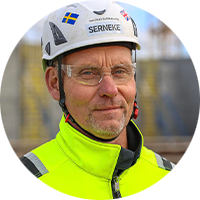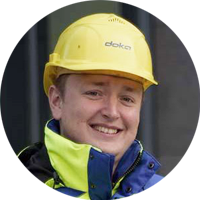Kalmarsundsverket
Kalmar, Sweden

Doka is shaping Kalmar's biggest investment ever - Kalmarsundsverket!
The project is a joint venture between Serneke and Kalmar Vatten to build a new recycling plant. It is a technically complex project that requires a high level of expertise on all fronts.
To meet future demands for wastewater treatment, Kalmar Vatten is planning one of Kalmar's most important future investments, the Kalmarsundsverket. In a collaborative project with Serneke, they are building a reliable and sustainable recycling plant that is cast in place with moulds and digital services from Doka. Kalmarsundsverket is expected to become operational in 2026.
In addition to its function as a wastewater treatment plant, Kalmarsundsverket will also recycle water that can be used for irrigation of green areas, agriculture and forestry but also for industrial water. The plant will also produce a desirable certified soil improver (fertiliser), and self-produced biogas will provide both electricity and heat. In other words, a cycle will be created in several areas, Kalmarsundsverket is a recycling plant that will:
- Reduce emissions of nitrogen and phosphorus by at least 35 per cent compared to today.
- Ensure the quality of bathing water for future generations.
- Purify up to 80 per cent of the water for reuse.
Type of building
Water treatment plant
Challenge
The height of the structure together with the tight timeframe meant that several steps had to be taken in advance at all times. The fault tolerance of the hourglass walls of the basins is extremely low as the machines that will generate movement in those spaces are prefabricated and customised. Here, one also needs to take into account the large lifting force that occurs during the casting process of the hourglass walls as the bottom plate is inclined and the hourglass life is horizontal. Another challenge is the proximity to Kalmar County Hospital. This requires tremendous logistical planning in order not to block traffic around the hospital area.
Solution
Together with designers, Serneke and other contractors, we find the right stage lengths that facilitate progress. We also made sure to give Serneke a larger amount of mould to give Serneke the opportunity to start future construction processes, but also to reduce the number of transports due to the nearby hospital. As the time aspect was an important detail, the customer benefited greatly from our concrete maturation computer Concremote.
Challenges of the project
The height of the construction together with the tight timeframe meant that we had to be several steps ahead at all times. Together with engineers, Serneke and other contractors, we find the right cycle lengths that facilitate progress. The error tolerance on the hourglass walls of the pools is extremely low as the machines that will generate movement in those spaces are prefabricated and dimensioned. It is also necessary to take into account the large lifting force that occurs during the casting process of the hourglass walls when the ground surface is inclined and the hourglass is horizontal.
Another challenge is the closeness to Kalmar County Hospital. This requires tremendous logistical planning so as not to block traffic around the hospital area. Therefore, one of Serneke's requirements was to have access to a large amount of formwork in order to start future construction processes but also to minimise the number of transports to and from the work site.

Säger Magnus Björngard | Blockchef Block M | Serneke
"Doka has met our requirement for professional project planning with accurate drawings and support to get the right amount of formwork on site. This was important for us, as we are not able to have too many deliveries in and out due to the nearby hospital area."
Ready-to-Use
Doka has a department at our Austrian headquarters that helps our customers with a "Ready-to-Use" solution. This department customises formwork according to customer needs and the requirements of the construction. The finished formwork are then transported directly to the construction site.
At Kalmarsundsverket, two of the structure's pools have an hourglass-shaped structure on the inner walls, which means that boxes need to be specially manufactured in order to achieve the required structure of the construction. When Doka presented its solution on how the hourglass walls could be constructed, Serneke considered it the most cost-effective solution.
Up to 70% faster with Concremote
To meet future demands for wastewater treatment, Kalmar Vatten is planning one of Kalmar's most important future investments, the Kalmarsundsverket. In a collaborative project with Serneke, they are building a reliable and sustainable recycling plant that is cast in place with moulds and digital solutions from Doka.
Challenges:
- Changing weather conditions (from 20°C to 0°C within a few days)
- Working in extreme cold (-20°C) – formwork coverage and heating needed
- Tremendous logistical planning needed to not block traffic around the hospital area nearby
Customer requirements:
- Fast and economical formwork solutions due to tight time frame
- Real-time monitoring and acceleration of the construction process
Concremote solution:
- Slab sensors
- Cable sensors with wall sensing elements for verticals to determine the most effective stripping time
- On site support

Time savings
Time to target value 2-4 days instead of planned 7 days (time till stripping formwork)

Enhanced concrete quality
Documentation on every cycle

Cost reduction
Significant cost savings through optimised use of formwork

Säger Magnus Björngard | Blockchef Block M | Serneke
"With the help of Concremote, we have been able to keep track of the maturity of the concrete and thus start stripping formwork as early as possible. This saves us valuable time and allows us to start the next casting processes faster."
Projektdata
Year of completion
2026
Project duration
2022-2026
Country
Sweden
City
Kalmar
Customer
Serneke
Concremote data
Used Concremote hardware
8 cable sensors 2.0 with wall sensing units and 4 slab sensors 2.0, approx. 130 pcs. multi-sensor cables
Concrete mixes in use
3 calibrated concrete mixes (C35/45, C40/50)
Number of measurements
250 (as of spring 2024), further measurements planned until completion
Systems used
Services used






